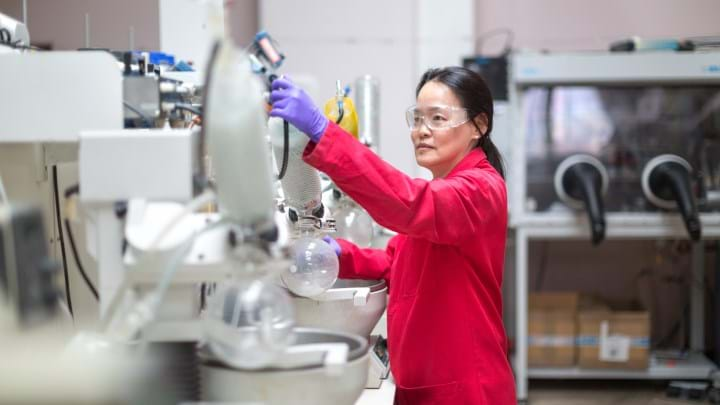Imperial College and BASF strengthen partnership that seeks innovative chemicals development – News
Imperial College London / Thomas Angus
Mimi Hii, Director of Imperial’s REACT centre, said it is great to help drive innovations in the chemical industry by deploying the outcomes of our collaboration in industrial practice
IMPERIAL College London and BASF have strengthened their partnership to advance chemicals development. This includes efforts to develop continuous production processes for smaller-scale chemicals manufacture.
This so-called ‘flow chemistry’ is a major focus of the industrial-academic partnership. The partners are using an interdisciplinary approach to research and development. The aim is to develop innovative processes that enable the chemicals industry to become more sustainable and resilient.
Traditionally, chemical R&D on the lab and pilot scale is carried out using batch techniques. Consequently, most fine and specialty chemicals including pharmaceutical and agrochemical actives are produced in batch. Put simply, it is only when much greater volumes of the chemical are required that the project is handed from a chemist to a chemical engineer who works to re-engineer production using continuous methods.
Continuous from the outset
The promise of flow chemistry is that with today’s availability of small modular process kit, including reactors and pumps, development can avoid the switch from batch and instead start out in the lab using continuous techniques. This is expected to produce various benefits. It should speed up process development and commercialization. It opens up the use of continuous production techniques for smaller volume specialty chemicals, agrochemicals and pharmaceuticals, which are conventionally produced at commercial scale in batch or semi-continuous processes.
Christian Holtze, Academic Partnership Developer and Principal Scientist for Flow Chemistry at BASF, said: “Compared to batch processes, flow chemistry offers novel and more direct synthesis routes, higher yield and selectivity, improved process safety, and greater space time yield.”
Holtze says flow chemistry can improve process safety because it uses smaller hold-up volumes of hazardous material. Also, by using microstructured reactors it is possible to eliminate the risk of detonation as the scale of the production kit is smaller than the cell size required to trigger a blast.
To help bring about these flow chemistry benefits the partners are working towards a paradigm shift that involves chemists, chemical engineers and data scientists from across Imperial’s departments working together in a way that will cut through some of the boundaries that exist between the disciplines and how they typically interact. The aim is to help create a more effective interconnected way of doing R&D that also builds a shared common language.
Much of the research is being carried out by doctoral students at Imperial’s two Centers for Doctoral Training – one focused on next-generation synthesis and reaction technology (REACT) and another in modern statistics and statistical machine learning. BASF is also offering internships to PhD students. The organizations want to train a new generation of PhD graduates with both industrial and academic research skills to help transform the chemical industries.
Klaus Hellgardt, Professor of Chemical Engineering at Imperial, said: “We are excited to be working with BASF not only to advance the science and engineering, but also to train a new generation of chemists who are familiar and cognate in flow chemistry. To get modern techniques into companies you need champions, and you need to create these champions.”
Digital transformation
Ruth Misener, Professor of Computational Optimization in Imperial’s Department of Computing, said: “Like many fields, industrial chemistry is undergoing a digital transformation in the 21st century, and one of our strengths at Imperial is in applying digital technologies to automate and optimise chemical R&D and manufacturing. This can greatly benefit from new algorithms that can be used in research, for example, to make decisions on which experiments should be carried out next.”
The partners say that beyond the efficiency and environmental benefits, the innovations in flow chemistry could help industry become more resilient to supply shocks as have occurred during the Covid-19 pandemic and the war in Ukraine. Operating at smaller scale could help industry decentralize chemicals production, and more easily substitute raw materials including switching away from fossil resources to the bio-based feedstocks needed for more sustainable production.
Representatives from the long-standing partners signed a master research agreement earlier this week covering their common strategic goals and how their relationship will be managed.



Comments are closed.